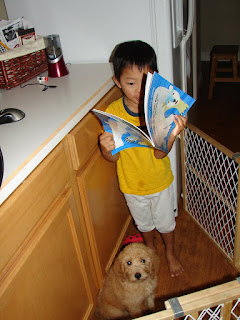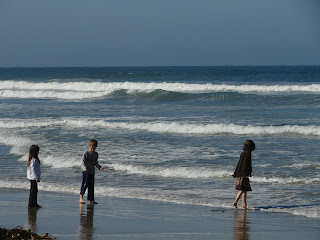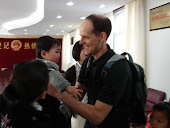"When a baby is picked up, spoken to, and loved,
he is starting his education as God planned it.
For all our lives we are human beings,
in an active state of learning, responding, understanding.
Education extends to all of life."
-Susan Schaeffar Macaulay, For the Children's Sake

he is starting his education as God planned it.
For all our lives we are human beings,
in an active state of learning, responding, understanding.
Education extends to all of life."
-Susan Schaeffar Macaulay, For the Children's Sake
Ideally, one would have a clear and detailed philosophy of education before beginning to teach. Such a philosophy would shape all of the planning and methods used and ensure more purpose in the teaching.
Or, if you're like me, you spend a few years teaching other people's kids and nearly a decade teaching your own before you really get a handle on what you're doing and how you want to do it.
Not that I didn't start with goals, mind you. My educational goals for my kids are simple: (1.) Be kids of character, courage, and conviction who love God and others will all their hearts (2.) Be the smartest kids in the whole world (3.) Do great things, including but not limited to: discover the cure for cancer, end world hunger, eradicate poverty....
Quite simple, really.
It was more the "how" part that tripped me up. The day to day. Early in my homeschool journey, it was suggested that everything should be hands on and exciting. I could build a model of a giant ear in my living room, a volcano in my kitchen, a rainforest in my bathroom, and a covered wagon in my backyard.
Or I could go to bed before 11:30pm each night and purchase all of the workbooks I could find so that my kids could fill in enough blanks to get into Harvard and I could still get the laundry done.
Recently I have been reading a lot about Charlotte Mason and her philosophy of education. I love it, and here are two reasons why:
Her emphasis on living books. She argued that it is in reading real, enjoyable, well-written books, that kids will learn and remember things.

If my kids ever left me and went to school down the road, I would probably not miss teaching fractions or diagramming sentences with them, but how lonely it would be to not share a really good read-aloud in the afternoon together.
Maybe I just subscribe to this philosophy because I am looking for someone to give me an excuse to read good books to my kids all day. But then, it has been pointed out that every time a student reads a book, the author becomes one of his or her teachers. So if my kids get to count C.S. Lewis, Laura Ingalls Wilder, E.B. White, the Apostle Paul, and King Solomon among their instructors, maybe they're not doing so bad after all.
Her emphasis on short lessons and lots of time for free play and exploration. Because I have other things to do in a day! But, oh yes, this isn't about me... Charlotte Mason believed in short (but effective)lessons and gave children the afternoons to play and enjoy being outdoors. She believed children would naturally ask questions about the world and find opportunities for learning and that free play was a very important part of childhood.

I agree and also feel that with so many entertainment options available now, playing and entertaining oneself is becoming a bit of a lost art. And if that is lost, so is imagination, creativity, and inventive thinking.

This is what I told my kids last week when the harshness of our summer weather let up and I shooed them away from the TV and the computer into the backyard. At first they groaned, but as the afternoon went on, shrieks of laughter and childhood delight came through the back door. Feeling satisfied that my children were experiencing childhood and learning in the natural way that they were meant to, I glanced outside.
Hmm, I wonder if Miss Mason's students ever spent the afternoon handcuffing each other to the garbage can? Or trying to start a campfire on the back lawn?
I wondered if perhaps I should call them in to do some more school work instead, something that would have more value in preparing them for Harvard. Was that little boy shoving a sock into his "prisoner's" mouth really going to discover a cure for cancer if he spent his afternoons like this?
But right about then, he came in looking for string. "We want to find out what will happen if we tie the cat up and throw her in the pool," he announced.
Well now, that's scientific inquiry about the natural world for you right there.
Or, if you're like me, you spend a few years teaching other people's kids and nearly a decade teaching your own before you really get a handle on what you're doing and how you want to do it.
Not that I didn't start with goals, mind you. My educational goals for my kids are simple: (1.) Be kids of character, courage, and conviction who love God and others will all their hearts (2.) Be the smartest kids in the whole world (3.) Do great things, including but not limited to: discover the cure for cancer, end world hunger, eradicate poverty....
Quite simple, really.
It was more the "how" part that tripped me up. The day to day. Early in my homeschool journey, it was suggested that everything should be hands on and exciting. I could build a model of a giant ear in my living room, a volcano in my kitchen, a rainforest in my bathroom, and a covered wagon in my backyard.
Or I could go to bed before 11:30pm each night and purchase all of the workbooks I could find so that my kids could fill in enough blanks to get into Harvard and I could still get the laundry done.
Recently I have been reading a lot about Charlotte Mason and her philosophy of education. I love it, and here are two reasons why:
Her emphasis on living books. She argued that it is in reading real, enjoyable, well-written books, that kids will learn and remember things.
If my kids ever left me and went to school down the road, I would probably not miss teaching fractions or diagramming sentences with them, but how lonely it would be to not share a really good read-aloud in the afternoon together.
Maybe I just subscribe to this philosophy because I am looking for someone to give me an excuse to read good books to my kids all day. But then, it has been pointed out that every time a student reads a book, the author becomes one of his or her teachers. So if my kids get to count C.S. Lewis, Laura Ingalls Wilder, E.B. White, the Apostle Paul, and King Solomon among their instructors, maybe they're not doing so bad after all.
Her emphasis on short lessons and lots of time for free play and exploration. Because I have other things to do in a day! But, oh yes, this isn't about me... Charlotte Mason believed in short (but effective)lessons and gave children the afternoons to play and enjoy being outdoors. She believed children would naturally ask questions about the world and find opportunities for learning and that free play was a very important part of childhood.
I agree and also feel that with so many entertainment options available now, playing and entertaining oneself is becoming a bit of a lost art. And if that is lost, so is imagination, creativity, and inventive thinking.
This is what I told my kids last week when the harshness of our summer weather let up and I shooed them away from the TV and the computer into the backyard. At first they groaned, but as the afternoon went on, shrieks of laughter and childhood delight came through the back door. Feeling satisfied that my children were experiencing childhood and learning in the natural way that they were meant to, I glanced outside.
Hmm, I wonder if Miss Mason's students ever spent the afternoon handcuffing each other to the garbage can? Or trying to start a campfire on the back lawn?
I wondered if perhaps I should call them in to do some more school work instead, something that would have more value in preparing them for Harvard. Was that little boy shoving a sock into his "prisoner's" mouth really going to discover a cure for cancer if he spent his afternoons like this?
But right about then, he came in looking for string. "We want to find out what will happen if we tie the cat up and throw her in the pool," he announced.
Well now, that's scientific inquiry about the natural world for you right there.



3 comments:
What a beautiful post. And I love that quote from one of my favorite books... Makes me want to go back and re-read it. Maybe I should since we are doing a whole lot of reading and free play these days. :)
I love reading about your family. :) And I love laughing. My kids are in the midst of exploring their imaginations as well... and because of Laura Ingalls Wilder we have several imaginary horses in the backyard that need to be fed and bears and turkeys to be shot, cleaned and eaten.
Love live good books.
I love it! You have taught them how to play cops and robbers, haven't you?
Post a Comment